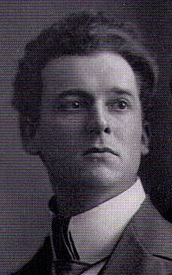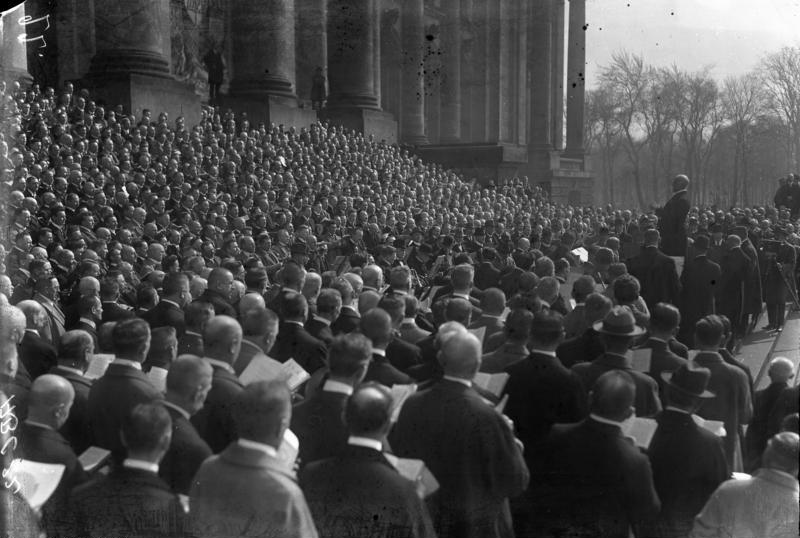Friedrich Wolters on:
[Wikipedia]
[Google]
[Amazon]
 Friedrich Wilhelm Wolters (2 September 1876, Uerdingen - 14 April 1930. Munich) was a German historian, poet and translator; one of the central figures in the George-Kreis.
Friedrich Wilhelm Wolters (2 September 1876, Uerdingen - 14 April 1930. Munich) was a German historian, poet and translator; one of the central figures in the George-Kreis.
 For this purpose, he published a new journal, the ' (Yearbook for the Spiritual Movement), edited by
For this purpose, he published a new journal, the ' (Yearbook for the Spiritual Movement), edited by
 In 1920 , he was appointed Professor of History at the University of Marburg, where he sought talented young men to join the Circle; making a significant impression on many. Some admired him, but rejected George. His students included Hans-Georg Gadamer, Herman Schmalenbach,
In 1920 , he was appointed Professor of History at the University of Marburg, where he sought talented young men to join the Circle; making a significant impression on many. Some admired him, but rejected George. His students included Hans-Georg Gadamer, Herman Schmalenbach,
 Friedrich Wilhelm Wolters (2 September 1876, Uerdingen - 14 April 1930. Munich) was a German historian, poet and translator; one of the central figures in the George-Kreis.
Friedrich Wilhelm Wolters (2 September 1876, Uerdingen - 14 April 1930. Munich) was a German historian, poet and translator; one of the central figures in the George-Kreis.
Life and work
He was the son of Friedrich Wolters, a businessman, and received his primary education in Rheydt and graduated from a gymnasium in Munich. In 1891, he began studying history, linguistics and philosophy at the University of Freiburg but, after one semester, returned to Munich. From 1899, he studied history and economics at Friedrich Wilhelm University in Berlin, with and Gustav von Schmoller. In 1900, he spent some time in Paris, attending lectures at the Sorbonne. He received his Doctorate in 1903. Two years later, he published an expanded version of his dissertation. From 1907 to 1908, he served as one of the private instructors to Prince August Wilhelm of Prussia, who was struggling to complete his Doctorate. It is believed that Wolters wrote the Prince's dissertation himself. It was accepted "summa cum laude
Latin honors are a system of Latin phrases used in some colleges and universities to indicate the level of distinction with which an academic degree has been earned. The system is primarily used in the United States. It is also used in some Sou ...
". Wolters received a few hundred Reichsmarks and was awarded the Order of the Crown, 4th class. After that, he earned his living as a teacher; primarily at girls' schools.
In 1909, after many years of trying to meet the poet Stefan George, whom he greatly admired, he finally attracted his attention with a pamphlet called ''Herrschaft und Dienst'' (Leadership and Service). Excerpts were published in George's magazine, '. Wolters description of an ideal ruler and his society was specifically designed to flatter George. Shortly after, they spent a few weeks together in Berlin. The following year, he was accepted into George's inner circle, as someone who could broaden his image among German youth.
 For this purpose, he published a new journal, the ' (Yearbook for the Spiritual Movement), edited by
For this purpose, he published a new journal, the ' (Yearbook for the Spiritual Movement), edited by Friedrich Gundolf
Friedrich Gundolf, born Friedrich Leopold Gundelfinger (20 June 1880 – 12 July 1931) was a German-Jewish literary scholar and poet and one of the best known academics of the Weimar Republic.
Education
Gundolf, who was the son of a mathemat ...
. It included several major contributions by Wolters. For the first volume, he proposed dividing the human mind into "creative" and "ordering" forces, which are in opposition.0 In the next volume, he expanded on the concept of " gestalt" and its relationship to holism
Holism () is the idea that various systems (e.g. physical, biological, social) should be viewed as wholes, not merely as a collection of parts. The term "holism" was coined by Jan Smuts in his 1926 book ''Holism and Evolution''."holism, n." OED Onl ...
. In volume three, he extended his concepts to their external state, calling upon youth to take responsibility for the renewal of society. His proposals rejected the idea of equality, in favor of a natural hierarchy, under the benevolent control of a charismatic leader.
Wolters commitment to George was unconditional, and he would beg permission from "The Master" before undertaking any action, however simple. His reverence reached the point where other members of the Circle referred to him as "St. Paul", and friends from his earlier days were appalled by what they considered to be a "hideous transformation". Although George greatly appreciated Wolter's contributions to his movement, these strong feelings were not returned. In fact, many of George's followers were uncomfortable with this degree of adoration, so Wolters essentially ended by creating his own "Circle".
In 1914, after a year of studying, he passed the habilitation
Habilitation is the highest university degree, or the procedure by which it is achieved, in many European countries. The candidate fulfills a university's set criteria of excellence in research, teaching and further education, usually including a ...
exam and became a private lecturer at the University. Shortly after, World War I broke out. He served as a driver and courier in several places, on both fronts, but never saw combat, although he did witness some events of the Serbian campaign. In his letters, he glorified the conflict and spoke of the spiritual feelings aroused by the war of attrition.Michael Philipp (Ed.): ''Stefan George, Friedrich Wolters: Briefwechsel 1904–1930'', Castrum Peregrini Presse, Amsterdam 1998, In 1915, while on leave, he married Erika Schwartzkopff, who he had met at the home of his former instructor, Breysig; also a member of the Circle.
Professor of History
 In 1920 , he was appointed Professor of History at the University of Marburg, where he sought talented young men to join the Circle; making a significant impression on many. Some admired him, but rejected George. His students included Hans-Georg Gadamer, Herman Schmalenbach,
In 1920 , he was appointed Professor of History at the University of Marburg, where he sought talented young men to join the Circle; making a significant impression on many. Some admired him, but rejected George. His students included Hans-Georg Gadamer, Herman Schmalenbach, Roland Hampe
Roland Hampe (2 December 1908 - 23 January 1981) was a German classical archaeologist. From 1959-1975 he was a professor at Heidelberg University.Hölscher, Tonio.Hampe, Roland" '' Brill's New Pauly Supplements'' I - Volume 6 : History of classica ...
and Adolf Reichwein. George stayed with Wolters for several weeks every year. In 1924, he received another professorship, at the University of Kiel. He owed that appointment to Carl Heinrich Becker
Carl Heinrich Becker (12 April 1876 – 10 February 1933) was a German orientalist and politician in Prussia. In 1921 and 1925–1930 he served as Minister for Culture in Prussia (independent). He was one of the founders of the study of t ...
, State Secretary at the Ministry of Education, who used his influence to promote members of the Circle. Once again, George was a regular visitor.
His wife, Erika, died in 1925. By this time, he had virtually abandoned history for nationalist propaganda. He also became involved in issues of racial purity, and was a major contributor to encouraging belief in what was called " Die schwarze Schmach" (The Black Disgrace). His position was somewhere between the German National People's Party (DNVP) and the German People's Party (DVP). He once took part in a völkisch memorial service for the right-wing martyr, Albert Leo Schlageter
Albert Leo Schlageter (; 12 August 1894 – 26 May 1923) was a World War I veteran and German ''Freikorps'' member who became famous for acts of post-war sabotage against French occupation forces. Schlageter was arrested for sabotaging a secti ...
. George, who disliked common politics, became increasingly skeptical of Wolters' ideas and motives.
In 1927 he remarried, to Gemma Thiersch (1907-1994), daughter of the architect Paul Thiersch
Paul Thiersch (2 May 1879, Munich - 15 November 1928, Hannover) was a German architect and designer.
Life and work
He was born to an illustrious family that produced notable people in several fields. His great-grandfather, Friedrich Thiersch wa ...
. Two years later, he published what he considered to be his " magnum opus": ''Stefan George und die Blätter für die Kunst. Deutsche Geistesgeschichte seit 1890'' (Stefan George and the Leaves of Art: German intellectual history since 1890). The critical reception was mixed. Even Friedrich Gundulf, one of George's early followers, thought it was a " hopelessly bad, thoroughly mendacious book". There were also anti-Semitic
Antisemitism (also spelled anti-semitism or anti-Semitism) is hostility to, prejudice towards, or discrimination against Jews. A person who holds such positions is called an antisemite. Antisemitism is considered to be a form of racism.
Antis ...
undertones that led Jewish members of the Circle, such as Karl Wolfskehl
Karl Wolfskehl (17 September 1869 – 30 June 1948) was a German Jewish author and translator. He wrote poetry, prose and drama in German, and translated from French, English, Italian, Hebrew, Latin and Old/Middle High German into German.
Bio ...
, to express their resentment.Gert Mattenklott, Michael Philipp, Julius H. Schoeps (Eds.), ''„Verkannte brüder“? Stefan George und das deutsch-jüdische Bürgertum zwischen Jahrhundertwende und Emigration'', Georg Olms Verlag, Hildesheim/Zürich/New York 2001, pp.31–53
He had suffered from heart problems since being hospitalized for severe rheumatism
Rheumatism or rheumatic disorders are conditions causing chronic, often intermittent pain affecting the joints or connective tissue. Rheumatism does not designate any specific disorder, but covers at least 200 different conditions, including art ...
in 1917, during the war. While visiting Munich in 1930, he became ill and was diagnosed with an arterial thrombosis
Thrombosis (from Ancient Greek "clotting") is the formation of a blood clot inside a blood vessel, obstructing the flow of blood through the circulatory system. When a blood vessel (a vein or an artery) is injured, the body uses platelets (thr ...
. After showing some improvement, he died suddenly, a month later, and was interred at the Waldfriedhof. His friends, and created the Friedrich Wolters Foundation; supported with funds from the University of Kiel. After Landmann's death, the Foundation became associated with the Nazis and his widow, , called for its dissolution. It continued to operate until 1937, when its funding was withdrawn.
References
Further reading
* Thomas Karlauf: ''Stefan George. Die Entdeckung des Charisma''. Blessing, Munich 2007, * Michael Philipp: "Wandel und Glaube. Friedrich Wolters – Der Paulus des George-Kreises". In: Wolfgang Braungart, Ute Oelmann, Bernhard Böschenstein (Eds.): ''Stefan George: Werk und Wirkung seit dem ‚Siebenten Ring‘''. Niemeyer, Tübingen 2001, pp. 283–299 * Bastian Schlüter: "Friedrich Wolters", In: Achim Aurnhammer, Wolfgang Braungart, Stefan Breuer, Ute Oelmann (Eds.): ''Stefan George und sein Kreis. Ein Handbuch''. Vol.3, de Gruyter, Berlin/New York 2012, pp. 1774–1779. * Wolfgang Christian Schneider: "Staat und Kreis, Dienst und Glaube. Friedrich Wolters und Robert Boehringer in ihren Vorstellungen von Gesellschaft". In: Roman Köster, Werner Plumpe, Bertram Schefold, Korinna Schönhärl (Eds.): ''Das Ideal des schönen Lebens und die Wirklichkeit der Weimarer Republik. Vorstellungen von Staat und Gemeinschaft im George-Kreis''. Akademie Verlag, Berlin 2009, pp. 97–122External links
* * {{DEFAULTSORT:Wolters, Friedrich 1876 births 1930 deaths German poets 20th-century German historians German translators German male poets German male non-fiction writers